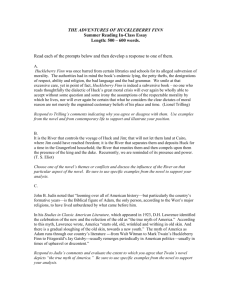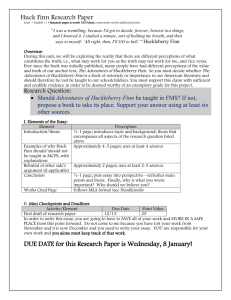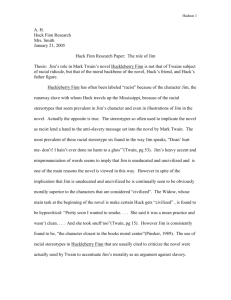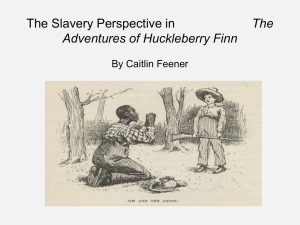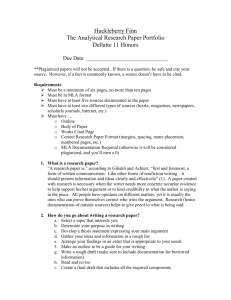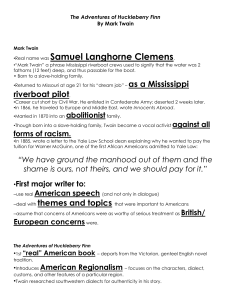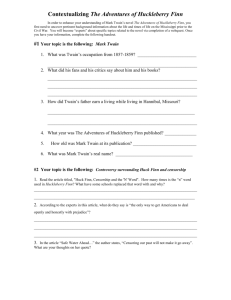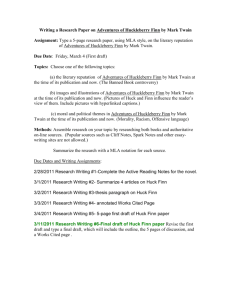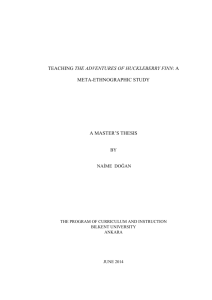File
advertisement
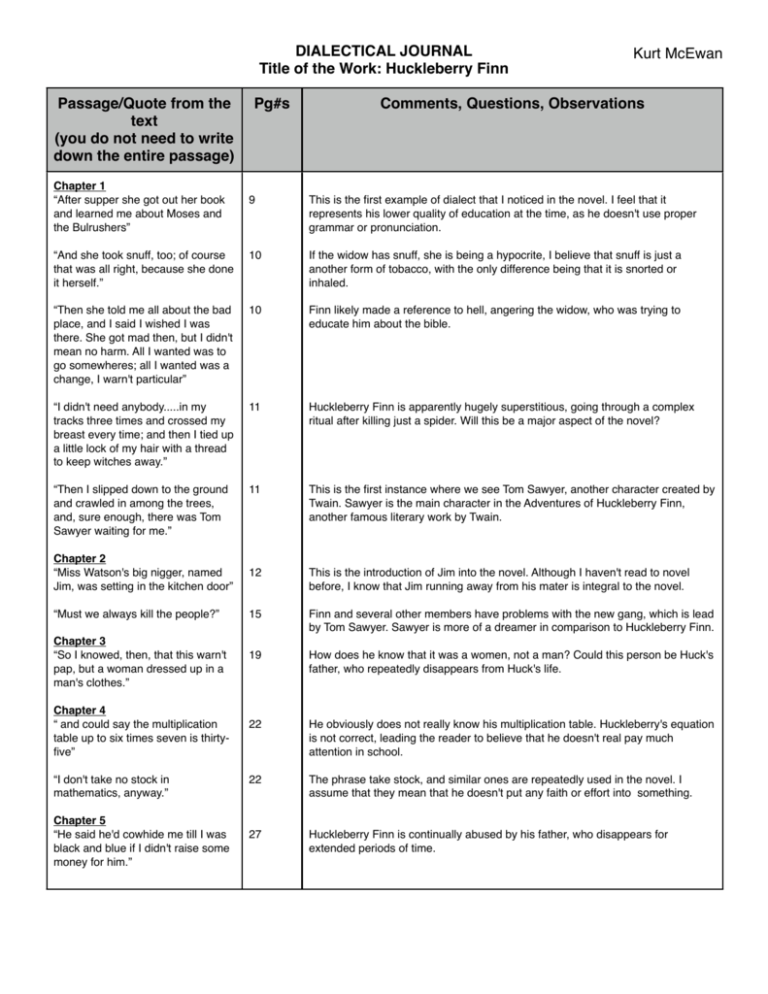
DIALECTICAL JOURNAL Title of the Work: Huckleberry Finn Passage/Quote from the text (you do not need to write down the entire passage) Chapter 1 “After supper she got out her book and learned me about Moses and the Bulrushers” Pg#s Kurt McEwan Comments, Questions, Observations 9 This is the first example of dialect that I noticed in the novel. I feel that it represents his lower quality of education at the time, as he doesn't use proper grammar or pronunciation. “And she took snuff, too; of course that was all right, because she done it herself.” 10 If the widow has snuff, she is being a hypocrite, I believe that snuff is just a another form of tobacco, with the only difference being that it is snorted or inhaled. “Then she told me all about the bad place, and I said I wished I was there. She got mad then, but I didn't mean no harm. All I wanted was to go somewheres; all I wanted was a change, I warn't particular” 10 Finn likely made a reference to hell, angering the widow, who was trying to educate him about the bible. “I didn't need anybody.....in my tracks three times and crossed my breast every time; and then I tied up a little lock of my hair with a thread to keep witches away.” 11 Huckleberry Finn is apparently hugely superstitious, going through a complex ritual after killing just a spider. Will this be a major aspect of the novel? “Then I slipped down to the ground and crawled in among the trees, and, sure enough, there was Tom Sawyer waiting for me.” 11 This is the first instance where we see Tom Sawyer, another character created by Twain. Sawyer is the main character in the Adventures of Huckleberry Finn, another famous literary work by Twain. Chapter 2 “Miss Watson's big nigger, named Jim, was setting in the kitchen door” 12 This is the introduction of Jim into the novel. Although I haven't read to novel before, I know that Jim running away from his mater is integral to the novel. “Must we always kill the people?” 15 Finn and several other members have problems with the new gang, which is lead by Tom Sawyer. Sawyer is more of a dreamer in comparison to Huckleberry Finn. 19 How does he know that it was a women, not a man? Could this person be Huck's father, who repeatedly disappears from Huck's life. 22 He obviously does not really know his multiplication table. Huckleberry's equation is not correct, leading the reader to believe that he doesn't real pay much attention in school. 22 The phrase take stock, and similar ones are repeatedly used in the novel. I assume that they mean that he doesn't put any faith or effort into something. 27 Huckleberry Finn is continually abused by his father, who disappears for extended periods of time. Chapter 3 “So I knowed, then, that this warn't pap, but a woman dressed up in a man's clothes.” Chapter 4 “ and could say the multiplication table up to six times seven is thirtyfive” “I don't take no stock in mathematics, anyway.” Chapter 5 “He said he'd cowhide me till I was black and blue if I didn't raise some money for him.” Kurt McEwan Passage/Quote from the text (you do not need to write down the entire passage) “ said he'd cowhide me till I was black and blue if I didn't raise some money for him.” Chapter 6 “By and by he rolled out and jumped up on his feet looking wild, and he see me and went for me. He chased me round and round the place with a clasp-knife, calling me the Angel of Death..... see who was who.” Chapter 7 “went to work on that log again. Before he was t'other side of the river I was out of the hole;” Pg#s Comments, Questions, Observations 27 His father also makes Finn mooches money for him to purchase liquor. 33 His father is also crazy, and may have some kind of mental issue. 36 Did he saw through the wall, of a log cabin? 92 Who is the dead man? Is he integral to the story? 95 Will the man bring bad luck, is this foreshadowing something? 108 How did the woman discover his identity? Will this lady play a role in the future of the novel? Chapter 8 I didn't find any phrases worth of mention in this chapter. Chapter 9 “It's a dead man. Yes, indeedy; naked, too. He's ben shot in de back. I reck'n he's ben dead two er three days. Come in, Huck, but doan' look at his face—it's too gashly.” Chapter 10 “He said it would fetch bad luck” Chapter 11 “Come, now, what's your real name?” Chapter 12 “Steamboat captains is always rich, and get sixty dollars a month, and they don't care a cent what a thing costs, you know, long as they want it.” Chapter 13 “the lantern show like a little spark at the texas door for a second, and we knowed by that that the rascals had missed their boat, and was beginning to understand that they was in just as much trouble now as Jim Turner was.” 119 Here we seeTwains admiration for the steamboat professions. In fact, I believe that his pen name is an allusion to the riverboating profession. 128 This part in the novel is a great example of where Huckleberry Finn has to follow his conscious to do something, despite the man about to be killed being a murderer, Huck still doesn't wish anything ill towards him Kurt McEwan Chapter 14 “Yit dey say Sollermun de wises' man dat ever live'. I doan' take no stock in dat.” Chapter 15 “Drinkin'? Has I ben a-drinkin'? Has I had a chance to be a-drinkin'?” Chapter 16 “Set her back, John, set her back!" says one. They backed water. "Keep away, boy—keep to looard. Confound it, I just expect the wind has blowed it to us. Your pap's got the smallpox, and you know it precious well. Why didn't you come out and say so? Do you want to spread it all over?” Chapter 17 “As soon as I was in the old gentleman he locked the door and barred it and bolted it, and told the young men to come in with their guns” Chapter 18 “Why, where was you raised? Don't you know what a feud is?” Chapter 19 “Trouble has done it, Bilgewater, trouble has done it; trouble has brung these gray hairs and this premature balditude. Yes, gentlemen, you see before you, in blue jeans and misery, the wanderin', exiled, trampled-on, and sufferin' rightful King of France.” Chapter 20 “but he said he had been in this country so long, and had so much trouble, he'd forgot it.” Chapter 21 “Hamlet's soliloquy, you know; the most celebrated thing in Shakespeare.” 138 Huck and Jim's conversation makes references to King Solomon of biblical times. Biblical references are apparently a key aspect of southern life, regardless of skin color or status. 149 Why is Jim acting so Bizzarre? 160 Huck is a proficient liar, this is proving to be an extremely useful skill whenever Huck is in a dangerous situation. 171 Why are the people so paranoid? 189 This feud seems to be similar to the Hatfield and McCoy feud. If the feuds are similar, then will they both end in violent blood baths between the families. 215 I believe he is referring to toIs he telling the truth in any of this? This part seems like an extremely long and complicated persona that he and the so called duke are taking on. 232 This seems to prove my previous question, it is like that the men are not from France, they are just pretending to be influential figure from France. 234 What is a soliloquy? Is it like a Shakespearean sonnet, some kind of poetry written in a certain form and meter? Chapter 22 Nothing of note in chapter Chapter 23 “When he's drunk there ain't no near-sighted man could tell him from a king.” Drinking alcohol and its effects on people seems to be a prevalent underlying theme of this novel, it's negative effects on people create many situations in the novel.
